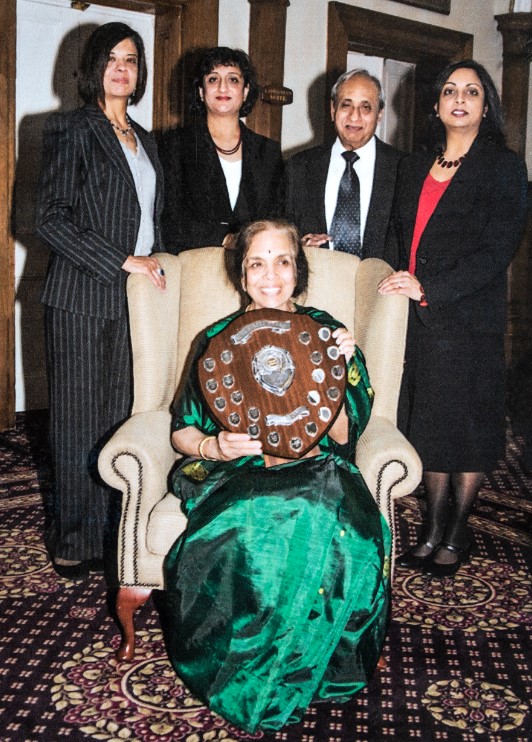Mr. Arvindbhai & Sudhaben Brahmbhatt
Introduction
have been living in Britain for last 50 years. I am an East African Asian. I was born in Arua in West Nile which is in the Northwest part of Uganda bordering Rwanda. I moved to Lugazi with my husband a professional Chemist working as a senior Manager in the sugar production factory and three lovely daughters. Our lives were fulfilled and extremely happy. Uganda is a very beautiful, lush and abundant country although poverty and other social problems do exist.
1972 Exodus
The wind of political change lifted Amin to power in 1972 and one of the key objectives was to Africanise Uganda by ridding it of the Asians. On the 5th of August 1972 Amin announced on national radio that all Asians were to leave Uganda within a period of three months. Our instant reaction was that he was not serious, but Amin reminded us every day on national radio how many days we had left before we had to leave. It silenced our laughter, instilled fear and panic. The presence of the army was intensified, they were seen carrying rifles and guns and their presence instilled fear and terror. Acts of brutality were regularly carried out; people were shot beaten and raped. We were shocked, sad and deeply distressed that we had to leave our beloved home, family and friends, a life that we had built together since we got married and, on the 14th, October 1972 we left Uganda with heavy, grieving, fearful hearts. As our plane took off, we did not realise that we would never see our homeland again.
Arrival in UK
Everything was different from what we had known, the language and the food especially. There were people at Heathrow waiting to welcome us with friendly smile and a hot cup of tea. Every family was sent to different settlement camp, ours was Greenham Common American Army camp in Berkshire. A large sign had been placed saying ‘Welcome Ugandan Asians’. We had to share a dormitory and bathroom with other families. I was lucky enough to speak enough English and after three days at the camp I joined the Women’s group. There were many volunteers from the locality who provided support and whom I came to know. I, in turn, became a volunteer helping teach English to some of the women of the camp. Some of the volunteers and their families befriended us, trying hard to settle us and keep us optimistic. They gave their time, kindness and support to my family and I will never forget the touch of humanity when we were in such a turmoil. The authorities attempted to find my husband employment, but he was depressed and in despair about not being able to return home.
Settlement in Hemel Hempstead
After about three months the authorities rehoused us in Hemel Hempstead although my husband still had no job. Major Ward Salvation Army welcomed us and help to settle down. None of us had any intention of going on benefit and he showed us all how to find work and we all found jobs in the factories in Maylands Avenue. I took up a job working in local factory where I was the first Asian woman to work there and environment was hostile and difficult, and I left and went to work somewhere else. I could speak English and got job at Kodak and there for 10 years. Our MP Robin Corbett was very helpful. The Baptist church helped us as much as they could but were not confident because they had no experience of asylum seekers at that time. With few prospects of finding a job similar to the one he had in Uganda my husband had to take whatever job he could find. After some time, he eventually found a job as an industrial chemist and continued working in the same place until he retired.
Selfless service
Hazel Ward obtained a grant for me to improve my English and I studied for one year at Dacorum college and eventually took up a post working for the Adult Education Service, moving some years later to the Youth and Community Department working with young Asian people. I acted as an interpreter for many services like police, social services and hospital, often in a voluntary capacity. The last part of my working life was where I was employed as Community Department Officer in the voluntary sector. I had many inroads into getting communities to work together and more importantly getting government agencies to work together to recognise the needs of minority communities in Dacorum. When the Youth and Community Service wanted to employ someone to advise them on what was happening in the minority community I was appointed by Linda Hay. We had come from a close community to a place where everyone was a stranger. When people got to know me and trust me, I formed an Asian Youth Club at Dacorum College and I earned the trust of Muslims. Being uprooted from their own cultures made life very difficult for some people and domestic violence was one of the problems that we had to deal with. I was acted as interpreter in the court and in the hospital, any sometimes paid and sometimes on a voluntary basis. I worked for Social Services until I resigned in 1990.
.png)
